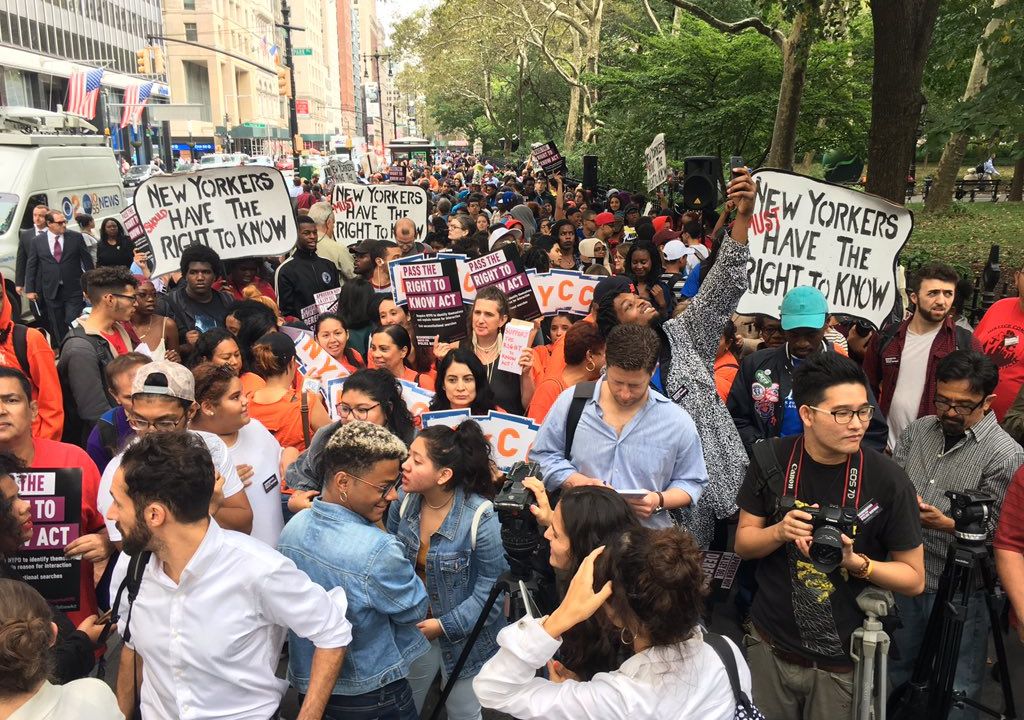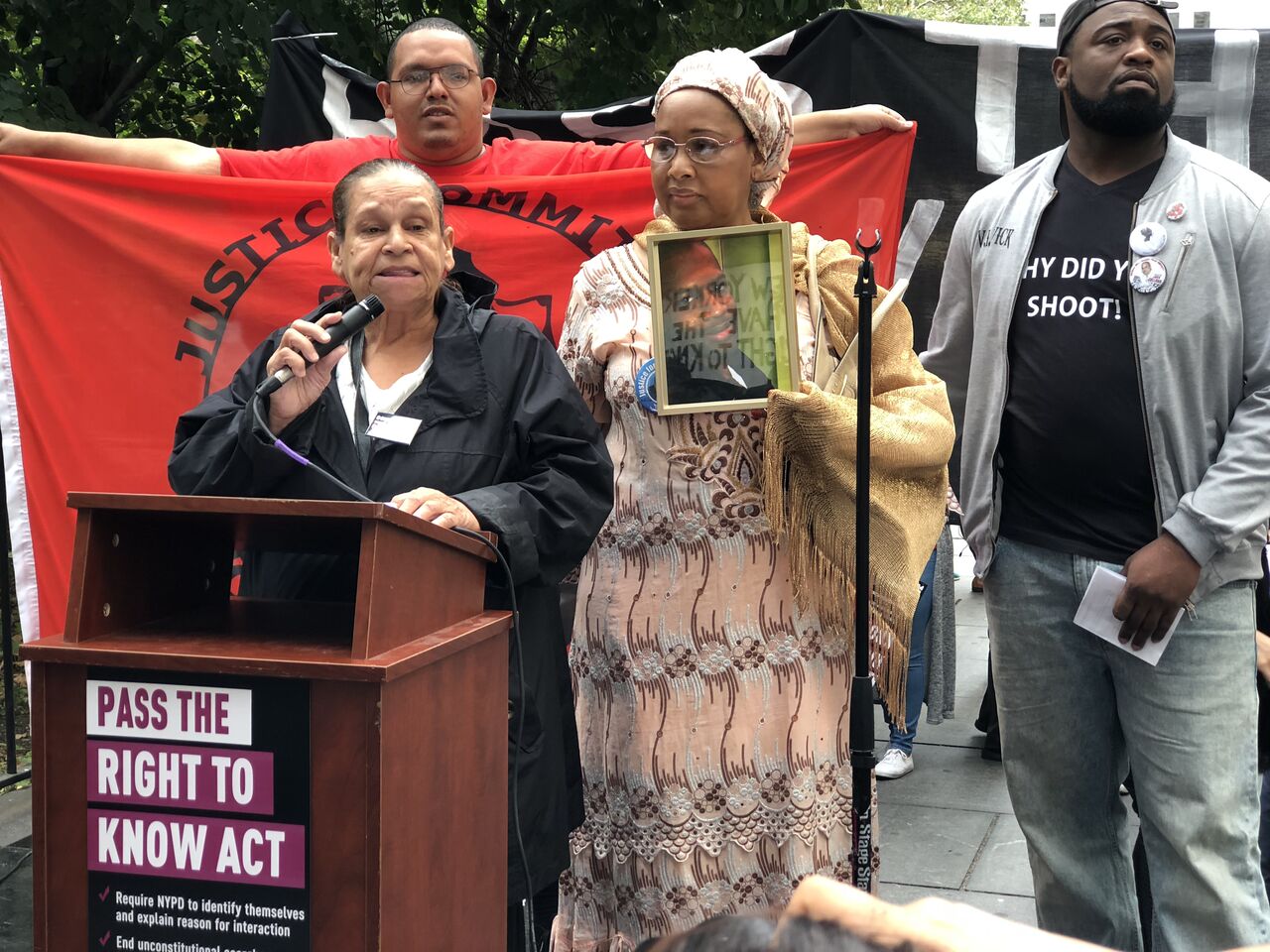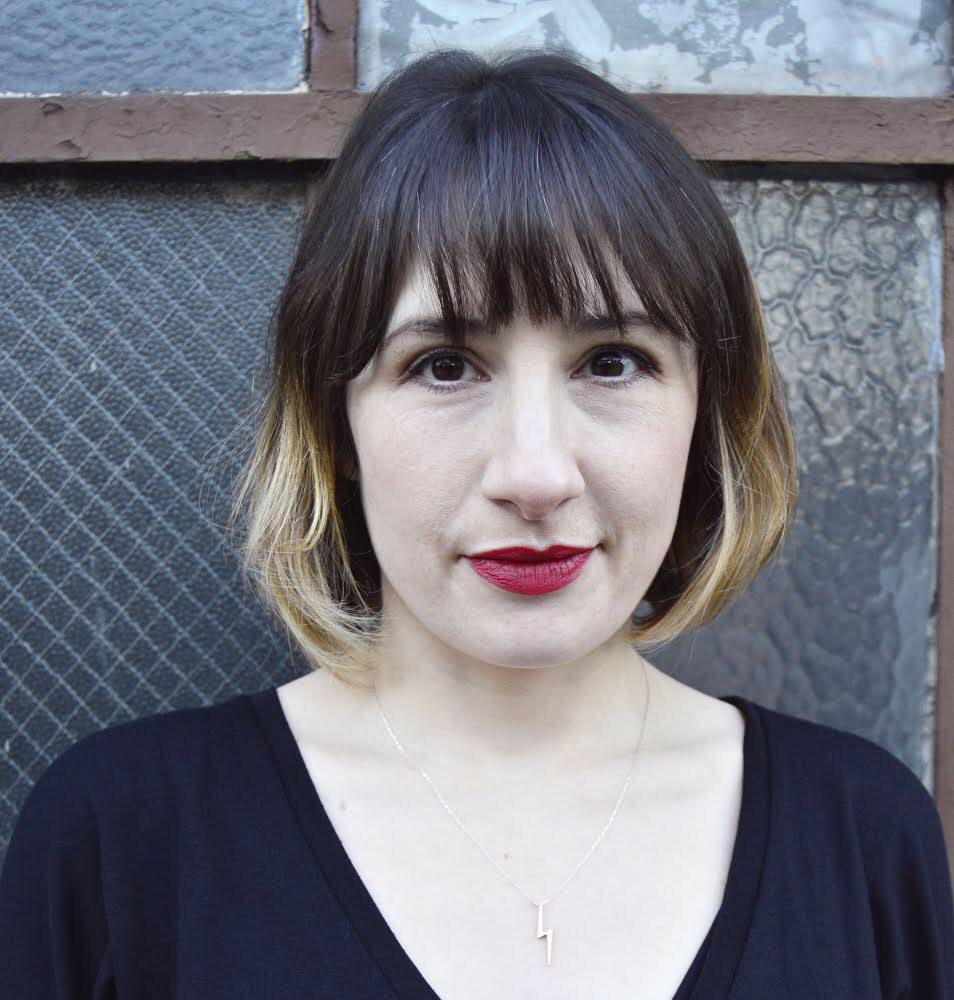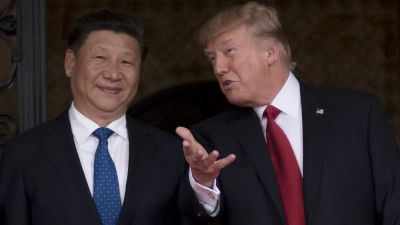
Right to Know Act rally in New York City on Oct. 12, 2017. (Photo courtesy of Make the Road New York)
This Q&A is part of Sarah Jaffe’s series Interviews for Resistance, in which she speaks with organizers, troublemakers and thinkers who are doing the hard work of fighting back against America’s corporate and political powers. This interview has been edited for length and clarity.
President Trump’s recent pronouncements have only drawn more attention to both the “Take a Knee” movement and the issues of police shootings and systemic racism. Just yesterday, free agent Colin Kaepernick filed a grievance against the NFL charging the organization with collusion because no team has signed him to play this season. Recently Sarah Jaffe talked with sibling organizers Victoria Davis and Victor Dempsey. Their brother, Delrawn Small, was shot by a New York City police officer in 2016. Now they are lobbying for a law to hold the NYPD more accountable. Sarah Jaffe spoke to them after a recent rally in the city where the protesters also took a knee.
Sarah Jaffe: Tell us about the Right to Know Act.
Victor Dempsey: The Right to Know Act is legislation that we are trying to get through that would hold the police accountable for their actions and instate more transparency and everyone feels a little safer.
SJ: What would the law actually do if it was passed?
Victor Dempsey: The first bill would require officers to identify themselves and explain the reason for official interaction. The second bill would help end deceptive and unconstitutional searches by requiring officers to explicitly convey a person’s rights to refuse a search warrant. This would be in effect when their consent is the only legal justification and objective proof that a person gave informed and voluntary consent.
SJ: Tell us your story. Why is this important to you and your family?
Victoria Davis: On July 4, 2016, NYPD officer Wayne Isaacs shot and killed my brother, Delrawn Small, and left him to die in the street without assistance. Wayne Isaacs was still sitting in the car when he shot Delrawn.
My family is demanding that Isaacs be held accountable [for killing our brother]. But we also know that holding one officer accountable will not end police violence. We need strong policy changes to help end abusive policing in New York City. Our family is demanding the Right to Know Act be passed and [for] Wayne Isaacs to be held accountable as civilians are always held accountable.
Dempsey: From the first day my brother was murdered by Wayne Isaacs, it was portrayed by certain media outlets that my brother assaulted Wayne Isaacs or he was in the wrong. It took roughly eight days for the video to surface and to show the truth. Having that transparency shows that an officer can actually lie about an incident to protect himself.
If that can happen to us, any scenario could happen. Someone could be walking down the street and a cop pulls them over for any unjust reason or just because they feel like they can without identifying themselves properly. People don’t know their rights to a search or if they can not give consent to a search.
SJ: Since your brother’s death, you have been working with the families of other people killed by police to do something about this, right?
Davis: Yes, we have. Inadvertently, I guess, we have become activists. We have always had a strong moral compass, the three of us: me, Victor and Delrawn. We had certain values and morals that we already lived by. This is not something foreign, advocating or fighting for people or standing up in the face of injustice. We just hadn’t done it in a public way until now.
Dempsey: What Victoria is saying is [that] our whole lives we have always looked at right and wrong from a point-blank perspective, and tried to help people encountering challenges to try to motivate and pushed people to do better for themselves. The murder of our brother kickstarted us to get more involved, to contact and connect with organizations and people and try to raise awareness. I remember before anything happened to my brother, being heartbroken seeing other cases — whether it was the Akai Gurley case or Nicholas Heyward or Kimani Gray.
Davis: Although we weren’t directly impacted, we have always understood how those occurrences reflect how people of color are treated and how they are handled by people who are hired to serve and protect.
SJ: Recently, you did a protest where you all took a knee outside of City Hall. Can you tell us a little bit about that and the significance of that action?
Dempsey: Being a football player and an avid football fan, when Colin Kaepernick took the original knee and recognizing why he took that knee after my brother’s death, it was really heavy on our hearts. The action that we took that day was, we had watched the city council, a few days previously at noon, to take a knee. We decided that we need to hold them accountable as well. People are getting on board with NFL players because they have that platform, the celebrity, so to speak, to get their voices heard. Our voices get heard selectively by people who want to listen.
Davis: The thing is that people were forgetting. It started to become a hashtag with some racist rhetoric. For the past few weeks, people have been forgetting the reason that Colin Kaepernick had originally taken the knee. He wasn’t against the national anthem, the flag or any of those things. He was taking a knee in solidarity with the victims and the families of police and state murders. For the murdered. For families like us who have loved ones who were killed by a police officer who was hired to serve and protect.
Dempsey: We wanted to align ourselves with him and take the knee with him to show that we appreciate what he is doing — and we are fighting as well. We are not just sitting here. We are fighting. And we are going to do whatever we can in our power to help make a change, because it has to stop.
— Victoria Davis
Davis: We don’t want anyone to forget why it was done in the first place. I think that sometimes people take hashtags and they do it for different reasons; it becomes almost like a fad. Taking a knee and putting faces to these victims and putting faces to the hurt cannot make everything right in our lives and make us just able to move on and move forward. We take a knee and that is taking a stand.
We still have to go back to our lives without Delrawn. Things have been terrible since he has been gone. But once we change the narrative and the way we see these police killings, then we will see it as not just a hashtag, but that these are humans, these are people. Delrawn was a human. He was a kind person. He was a reliable person. He meant everything to us.
SJ: For people who are listening or reading in New York, what can they do to support the work you are doing here around the Right to Know Act, and what can people do around the country to support the broader struggle that you and other families are facing?
Davis: We do live in the age of social media. Social media is the biggest platform. Definitely, I encourage people to follow the Justice for Delrawn Facebook page and the @Justice4Delrawn Twitter page. Sometime in the near future we should have an official webpage. We deal with a lot of organizations. We are part of Families United 4 Justice, which is an organization collectively of families who have been affected by police brutality — which is national. We encourage people to follow [them]. Use all of the information that you have gained online or meeting with families, speaking with the families, whether it is in person, online and just help change the narrative.
Dempsey: Support, as far as going to City Council meetings, pressuring the council to let them know change has to be made. It is not just only in New York. Like Victoria said, we live in a social media age. Retweeting tweets, following pages, supporting it, continuously push the word out and let people know we are not going to stand around while people are getting killed.

Iris Baez, mother of Anthony Baez (killed by NYPD in 1994); Hawa Bah, mother of Mohamed Bah (killed by NYPD in 2012); Victor Dempsey, brother of Delrawn Small (killed by NYPD officer in 2016). (Photo by Alberto Morales)
Victoria: Delrawn was a huge part of our life. He was our caretaker. Our mother died when we were children, so Delrawn has always been not just a sibling, but a father as well. A person who would lead us and guide us. Our confidant. He was a person that loved and cared for us and his children. He has three children. We have huge shoes to fill and trying to figure out how to do that is hard. Reliving the situation, the murder over and over again is hard. Grief and mourning is terrible in itself. Missing someone is terrible. If someone walks out of your life, that is terrible. But, to miss someone when they were taken unjustly is just…it is the worst, because all of these questions of why? How?
These police killings and murders affect families in all types of ways. It is a trickle-down effect. It makes you feel not safe and we are supposed to. These people who took an oath to serve and protect, but if they couldn’t do that for me, then what else…?
Dempsey: Like my sister said, we want accountability — and not just for Wayne Isaacs, but for the whole NYPD. When officers commit a crime, which it literally is committing a crime, it is not looked at as a crime. It is looked at as “Oh, in some instances, it was justified because he was in fear for his life.” That is a key phrase that officers use these days: “I was afraid for my life,” so they discharge their weapons.
This is a continuous battle of emotions. It is a continuous fight within yourself to keep pushing forward. We come out to these rallies, to these functions to support, to gain support, and it is very hard. It is emotionally draining, but we do it because we know our brother did not die in vain.
The awareness aspect of this is much bigger than just saying, “OK, we need a change.” Like Victoria said, we have to hold everyone accountable. These council members who are taking knees and making these statements, they need to be held accountable. They need to be at our court dates with us fighting against the unjust things that are happening. They cannot just do it for whoever is looking or whoever is running for office. They cannot do it for that. They cannot use the lives of people that are suffering and not acknowledge it.
That is one of our biggest things right now, is everyone needs to be aware. If you are going to hashtag something, if you are going to say you stand for something, at least stand with the people that are actually suffering.
Our trial starts Oct. 18 at Brooklyn Supreme Court for Wayne Isaacs, the officer who murdered our brother. We ask anyone and everyone to support that. Attend the courts. We try to pack the court as much as possible just to let the system know that we are holding them accountable. Not just the families: as a community, as a unit, as a whole, collectively, everyone. We will do the same for any other families or any other situation that needs to be rectified.
Interviews for Resistance is a project of Sarah Jaffe, with assistance from Laura Feuillebois and support from the Nation Institute. It is also available as a podcast on iTunes. Not to be reprinted without permission.




